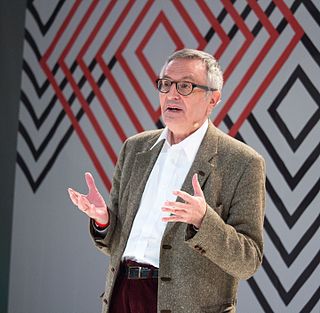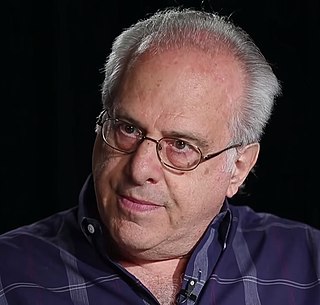
Political philosophy or political theory is the philosophical study of government, addressing questions about the nature, scope, and legitimacy of public agents and institutions and the relationships between them. Its topics include politics, liberty, justice, property, rights, law, and the enforcement of laws by authority: what they are, if they are needed, what makes a government legitimate, what rights and freedoms it should protect, what form it should take, what the law is, and what duties citizens owe to a legitimate government, if any, and when it may be legitimately overthrown, if ever.
Secularism is the principle of seeking to conduct human affairs based on naturalistic considerations, uninvolved with religion.
Pluralism as a political philosophy is the diversity within a political body, which is seen to permit the peaceful coexistence of different interests, convictions, and lifestyles. While not all political pluralists advocate for a pluralist democracy, this is the most common stance, because democracy is often viewed as the most fair and effective way to moderate between discrete values. Political theorist Isaiah Berlin, a strong supporter of pluralism, wrote: "let us have the courage of our admitted ignorance, of our doubts and uncertainties.

Fredric Jameson is an American literary critic, philosopher and Marxist political theorist. He is best known for his analysis of contemporary cultural trends, particularly his analysis of postmodernity and capitalism. Jameson's best-known books include Postmodernism, or, The Cultural Logic of Late Capitalism (1991) and The Political Unconscious (1981).

Robert Alan Dahl was an American political theorist and Sterling Professor of Political Science at Yale University.

John Nicholas Gray is an English political philosopher and author with interests in analytic philosophy, the history of ideas, and philosophical pessimism. He retired in 2008 as School Professor of European Thought at the London School of Economics and Political Science. Gray contributes regularly to The Guardian, The Times Literary Supplement and the New Statesman, where he is the lead book reviewer. He is an atheist.
Richard E. Flathman was the George Armstrong Kelly Professor of Political Science, emeritus, at Johns Hopkins University. He is known for having pioneered, with Brian Barry, David Braybrooke, Felix Oppenheim, and Abraham Kaplan, the application of analytic philosophy to political science. He was a leading advocate of liberalism and a champion of individuality. He defended a conception of social freedom according to which it is "negative, situated, and elemental."
Sheldon Sanford Wolin was an American political theorist and writer on contemporary politics. A political theorist for fifty years, Wolin became Professor of Politics, Emeritus, at Princeton University, where he taught from 1973 to 1987.

Nancy Fraser is an American philosopher, critical theorist, feminist, and the Henry A. and Louise Loeb Professor of Political and Social Science and professor of philosophy at The New School in New York City. Widely known for her critique of identity politics and her philosophical work on the concept of justice, Fraser is also a staunch critic of contemporary liberal feminism and its abandonment of social justice issues. Fraser holds honorary doctoral degrees from four universities in three countries, and won the 2010 Alfred Schutz Prize in Social Philosophy from the American Philosophical Association. She was President of the American Philosophical Association Eastern Division for the 2017–2018 term.

Brian Massumi is a Canadian philosopher and social theorist. Massumi's research spans the fields of art, architecture, cultural studies, political theory and philosophy. His work explores the intersection between power, perception, and creativity to develop an approach to thought and social action bridging the aesthetic and political domains. He is a retired professor in the Communications Department of the Université de Montréal.

Michael Joseph Shapiro is an American educator, theorist, and writer. He is a Professor Emeritus of Political Science at the University of Hawaiʻi at Mānoa. His work is often described as "postdisciplinary," drawing from such diverse fields as political philosophy, critical theory, cultural studies, film theory, international relations theory, literary theory, African American studies, comparative politics, geography, sociology, urban planning, economics, psychoanalysis, crime fiction, genre studies, new musicology, aesthetics and indigenous politics.
Agonism is a political and social theory that emphasizes the potentially positive aspects of certain forms of conflict. It accepts a permanent place for such conflict in the political sphere, but seeks to show how individuals might accept and channel this conflict positively. Agonists are especially concerned with debates about democracy, and the role that conflict plays in different conceptions of it. The agonistic tradition to democracy is often referred to as agonistic pluralism. A related political concept is that of countervailing power. Beyond the realm of the political, agonistic frameworks have similarly been utilized in broader cultural critiques of hegemony and domination, as well as in literary and science fiction.

Richard David Wolff is an American Marxian economist known for his work on economic methodology and class analysis. He is a professor emeritus of economics at the University of Massachusetts Amherst and a visiting professor in the graduate program in international affairs of the New School. Wolff has also taught economics at Yale University, City University of New York, University of Utah, University of Paris I (Sorbonne), and The Brecht Forum in New York City.
Walter Benn Michaels is an American literary theorist and author whose areas of research include American literature, critical theory, identity politics, and visual arts.
Posthegemony or post-hegemony is a period or a situation in which hegemony is no longer said to function as the organizing principle of a national or post-national social order, or of the relationships between and amongst nation states within the global order. The concept has different meanings within the fields of political theory, cultural studies, and international relations.
Catherine Keller is a contemporary Christian theologian and Professor of Constructive Theology at Drew University's Graduate Division of Religion. As a constructive theologian, Keller's work is oriented around social and ecological justice, poststructuralist theory, and feminist readings of scripture and theology. Both her early and her late work brings relational thinking into theology, focusing on the relational nature of the concept of the divine, and the forms of ecological interdependence within the framework of relational theology. Her work in process theology draws on the relational ontology of Alfred North Whitehead, fielding it in a postmodern, deconstructive framework.
David Campbell is an Australian political scientist. He is known for his writing on photography and post-realism.
Jane Bennett is an American political theorist and philosopher. She is the Andrew W. Mellon Professor of the Humanities at the Department of Political Science, Johns Hopkins University School of Arts and Sciences. She was also the editor of the academic journal Political Theory between 2012 and 2017.

Jodi Dean is an American political theorist and professor in the Political Science department at Hobart and William Smith Colleges in New York state. She held the Donald R. Harter ’39 Professorship of the Humanities and Social Sciences from 2013 to 2018. Dean has also held the position of Erasmus Professor of the Humanities in the Faculty of Philosophy at Erasmus University Rotterdam. She is the author and editor of thirteen books. Her most recent book is titled Comrade: An Essay on Political Belonging.
Kennan Ferguson is an American political theorist who writes on contemporary issues concerning pluralism and the quotidian. He is the Director of The Center for 21st Century Studies at The University of Wisconsin–Milwaukee, and co-editor of the academic political philosophy journal Theory and Event.








